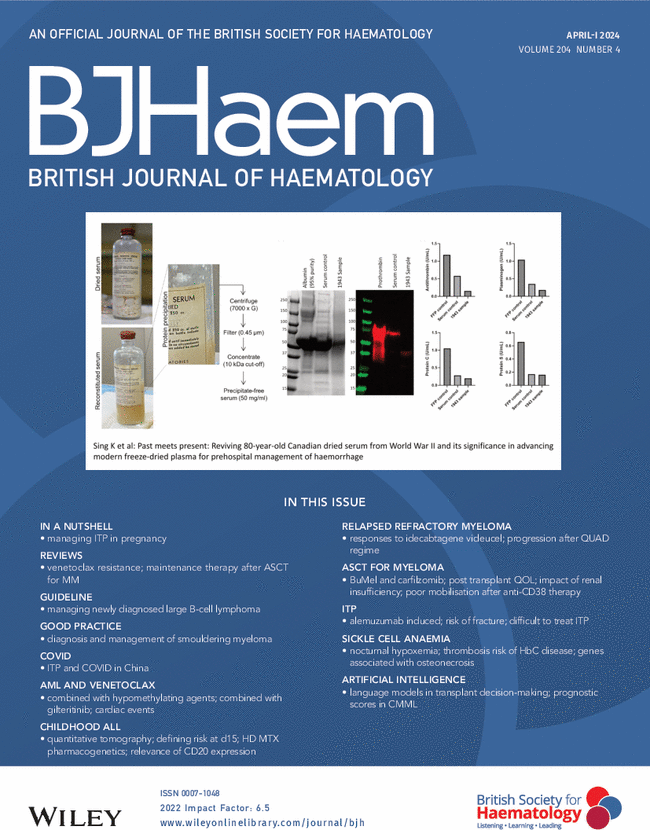血液恶性肿瘤的嵌合抗原受体 T 细胞疗法:从基础研究和转化研究到床边实践的启示
IF 5.1
2区 医学
Q1 HEMATOLOGY
引用次数: 0
摘要
摘要自体嵌合抗原受体(CAR)T细胞疗法彻底改变了淋巴恶性肿瘤的治疗,CD19-CAR T细胞被批准用于治疗B细胞淋巴瘤和急性白血病,最近,B细胞成熟抗原-CAR T细胞被批准用于治疗多发性骨髓瘤。对在早期临床试验中接受治疗的患者进行的长期随访表明,患者病情有可能长期缓解,这意味着可以治愈。这与长期严重副作用发生率低以及应答者生活质量迅速改善有关。相比之下,其他类型的免疫疗法则需要长期治疗,或存在长期副作用影响生活质量的风险。尽管取得了令人瞩目的成果,但仍有一些患者治疗失败或最终复发,这说明必须改进 CAR T 细胞疗法,更好地了解其疗效的决定因素,以最大限度地提高疗效。毫无疑问,下一代 CAR T 细胞将更加有效,但在利用现有 CAR T 细胞时,仍有优化的机会。这篇综述文章旨在总结临床、转化和基础研究的现有证据,为临床医生提供见解,以加深他们对 CAR T 细胞的理解和使用。本文章由计算机程序翻译,如有差异,请以英文原文为准。
Chimeric antigen receptor T‐cell therapy for haematological malignancies: Insights from fundamental and translational research to bedside practice
SummaryAutologous chimeric antigen receptor (CAR) T‐cell therapy has revolutionized the treatment of lymphoid malignancies, leading to the approval of CD19‐CAR T cells for B‐cell lymphomas and acute leukaemia, and more recently, B‐cell maturation antigen‐CAR T cells for multiple myeloma. The long‐term follow‐up of patients treated in the early clinical trials demonstrates the possibility for long‐term remission, suggesting a cure. This is associated with a low incidence of significant long‐term side effects and a rapid improvement in the quality of life for responders. In contrast, other types of immunotherapies require prolonged treatments or carry the risk of long‐term side effects impairing the quality of life. Despite impressive results, some patients still experience treatment failure or ultimately relapse, underscoring the imperative to improve CAR T‐cell therapies and gain a better understanding of their determinants of efficacy to maximize positive outcomes. While the next‐generation of CAR T cells will undoubtingly be more potent, there are already opportunities for optimization when utilizing the currently available CAR T cells. This review article aims to summarize the current evidence from clinical, translational and fundamental research, providing clinicians with insights to enhance their understanding and use of CAR T cells.
求助全文
通过发布文献求助,成功后即可免费获取论文全文。
去求助
来源期刊
CiteScore
8.60
自引率
4.60%
发文量
565
审稿时长
1 months
期刊介绍:
The British Journal of Haematology publishes original research papers in clinical, laboratory and experimental haematology. The Journal also features annotations, reviews, short reports, images in haematology and Letters to the Editor.

 求助内容:
求助内容: 应助结果提醒方式:
应助结果提醒方式:


